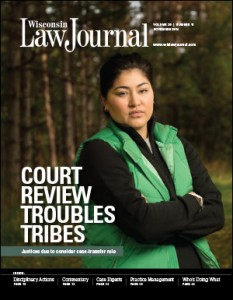UPDATE:
- July 28, 2016 Opinion & Dissent, Wisconsin Supreme Court Case No. 14-02, In the matter of the Petition to Amend/Dissolve Wisconsin Statute § 801.54 Discretionary Transfer of Civil Action to Tribal Court
III. Rule Petition 14-02: Proposed Amendment/Dissolution of Wisconsin Statute §801.54 Discretionary Transfer of Civil Actions to Tribal Court. Preliminary Memo circulated 9/15/14. Not reached for discussion 9/22/14; 9/29/14.
UPDATE 2: The Wisconsin Supreme Court decided to allow the petition to stand and to move its own review of Staute 801.54 from January 2016 to the Fall of 2015 and to hold a public hearing on the rule as well as hear from the petitioners at that same time.
Below is an excerpt from the cover story of the November 2014 issue of the Wisconsin Law Journal by Eric Heisig:

OTIW Member Nona Danforth
Court review troubles Tribes
A clash between a small group of [Oneida Tribe of Indians of Wisconsin] members and tribal leadership has made its way to the state Supreme Court and could limit sovereignty for 10 other tribes.
The Oneida group, which seeks to stop what its members say is a dangerous tribal judiciary, is made up of people who claim they were spurned by judicial officers in the eastern Wisconsin tribe. Members have raised concerns about, among other things, conflicts of interest in the courts and judicial qualifications.
They submitted a petition in July asking the state’s highest court to take away circut court judges’ rights to transfer civil cases to tribal courts because, the group argued, the tribal judges are incapable of properly handling cases. …
“These judges are supposed to be qualified,” [OTIW member Nona] Danforth said. “These people are not qualified at all.” …
The state Supreme Court rule, statute 801.54, which allows transfers from state to tribal courts, was passed with a 4-3 vote by the justices six years ago. That close vote [has tribal leaders] worried that the petition could prompt reconsideration and reversal[.] …
According to the petition, “We believe the government officials, relevant areas of the Oneida Tribe, the judicial system and its elected judicial officers, have failed to protect our children and families. For this reason, we have chosen to pursue this matter as a means to defend and protect our children and families to the best of our ability.” …
[Nona] Danforth, who is registered with the Supreme Court’s clerk as the petitioning group’s leader, said there are other young mothers who support change but did not sign the petition because they are afraid of retaliation. …
Complaints about the tribe’s court system, which has been in place since 1991, include judicial officers allegedly hearing cases involving family members and claims there were rulings that had no basis in law. Another petitioner, Linda Dallas, a former tribal judicial officer, said members of the judiciary often weigh what family a person comes from in making their decisions.
“I assure you,” Dallas said, “there’s people just like us in all the other tribes, too.”
The WLJ article also says that most of the cases transferred to tribal courts involve child support, and the Oneida Business Committee unilaterally decided to eliminate one Trial Court judge position and replace it with a second Family Court judge position based on OBC’s expectation that such cases would likely make up 80% of the Oneida Judiciary’s caseload:
- BC Resolution 03-26-14-D, Adoption of Emergency Amendments to the Judiciary Law/Transition Plan
If the Wisconsin Supreme Court decides to stop sending civil cases including child support issues to tribal courts, will the amount of money that OBC has budgeted for the Oneida Judiciary be justified?
More importantly, does the Oneida Tribe really need a Judiciary if its judges not only don’t have the same qualifications as county and state court judges but do have track records of violating the Election Law, lying about being law school graduates and attorneys, as well as a Chief Justice who is married to and lives with a multiple-state sex offender who used force, and yet are paid around $75,000-$100,000 per year?
